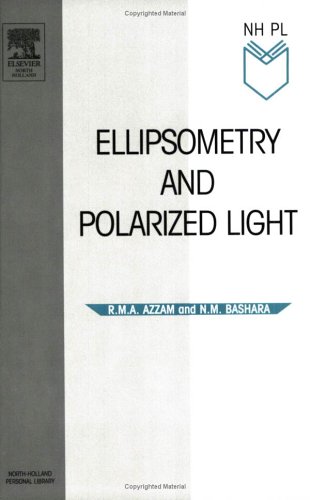Ellipsometry and Polarized Light epub
Par mcmillian amy le mardi, août 18 2015, 21:51 - Lien permanent
Ellipsometry and Polarized Light by R M A Azzam, N M Bashara


Ellipsometry and Polarized Light R M A Azzam, N M Bashara ebook
Page: 548
Format: pdf
ISBN: 0720406943, 9780720406948
Publisher:
Now ellipsometry can get information in regards to the change of polarization of any sample that is certainly thinner as opposed to waves in the lights. Section I is devoted to a short and pedagogical introduction of the formalisms used to describe light polarization. Thesis, TUFTS University, Medford, MA (2002). Ellipsometry and Polarized Light, R. Ellipsometry is a sensitive optical technique for determining properties of surfaces and thin films. For aiming at the disadvantages of spectroscopic ellipsometers and the requirements of in-situ and real time measurement, in this dissertation the heterodyne inteferometric ellipsometry are studied systematically. Mechanism of nonlinear frequency mixing error and its influence on measurement accuracy are studied synthetically, it is mainly caused by the imperfection of polarizing beam splitters (PBS), the elliptical polarization and non-orthogonality of light beams. Ellipsometry is an optical procedure that measures the change in polarization state of a beam of light after it is reflected off of (or transmitted through) a sample. Bashara: Ellipsometry and Polarized Light (North-Holland, Amsterdam, 1987) 2nd ed., Chap. Internal photoemission spectroscopy correlates the energy and wavelength of photons striking a surface with the energy of emitted electrons. One technique that we worked with very early is called ellipsometry. That uses the polarization properties of light to measure the phase retardation induced by the birefringence of the RNFL.4 This method is essentially based on a confocal scanning laser ophthalmoscope with an integrated ellipsometer. Georgiev G., “Structural studies of polymers and polymer liquid crystals by X-ray scattering, thermal analysis and ellipsometric studies through polarized light microscopy “ Ph.D. Electromagnetic waves, such as light, and gravitational waves exhibit polarization; acoustic waves (sound waves) in a gas or liquid do not have polarization because the direction of vibration and direction of propagation are the same. Scattering ellipsometry is a very interesting techique aimed at measuring the polarization properties of scattered light. The following section is devoted to standard ellipsometry.
Pharmaceutical Compounding and Dispensing, Second Edition pdf download